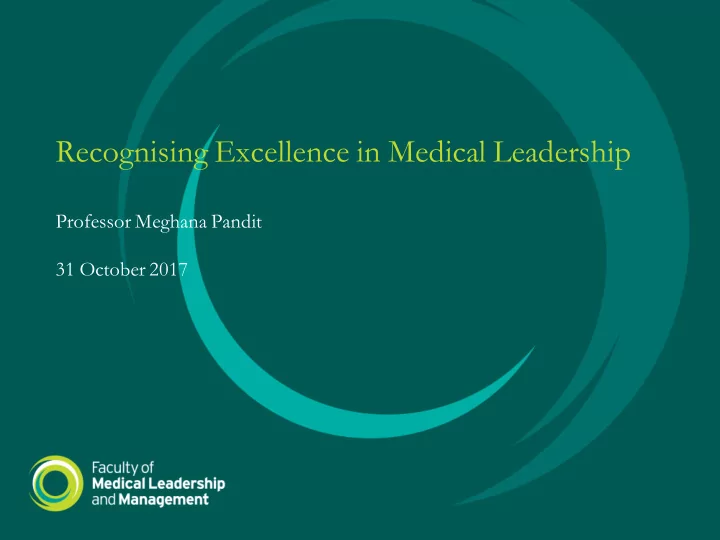

Recognising Excellence in Medical Leadership Professor Meghana Pandit 31 October 2017
Introduction
Summary • My thoughts about what makes an effective medical leader • Training, standards & certification
Leadership ‘The ability of an individual to influence, motivate and enable others to contribute toward the effectiveness and success of organisations of which they are members’ House et al . 2002
Leadership Styles • Democratic • Dictatorial • Facilitative • Visionary • Pacesetting Any / many styles used on a single day
What leadership means to me • Being responsible • Leading by example • Enabling others to do their best • Setting and articulating priorities • Supporting and developing others and oneself • Defining boundaries • Promoting a learning & improvement culture • Displaying values: compassion, openness, partnership, respect, learning
Leadership • Research evidence suggests that leadership impacts positively at three levels: the patient, the organisation and the individual • Growing evidence base for the link between leadership and quality and safety for patients • Kirkup report • CQC State of Care 2016/17 • Involvement in finance, HR, operational management leading to high quality patient care with increasing accountability
Training in Medical Leadership • Undergraduate and postgraduate medical training – increasing opportunities for bespoke training in leadership • Recognised MD - MBA programs in USA • National Fellowship schemes • Need to professionalise medical leadership through standards and certification
Standards • Insufficient clarity about expectations of doctors in leadership and management roles • No ‘gold standard’ of achievement for benchmarking • Distinguished international reputation for clinical standards – need to replicate for leadership and management
Leadership and management standards for medical professionals • Standards need to be realistic, aspirational, current and stretching CORE VALUES The seven Self Team player / Corporate System BEHAVIOUR SET 1 BEHAVIOUR SET 2 BEHAVIOUR SET 3 BEHAVIOUR SET 4 principles of team leader responsibility leadership public life GMC Good Medical Practice
Use of the standards Individuals Organisations Support continued improvement in Personal and professional development individual practice Support applying for medical leadership Supporting, encouraging and coaching and management roles colleagues To help understanding the skills already Recruitment mastered Commissioning and guiding leadership Identify the skills they might usefully development develop for such roles Be recognised for achievement in this area Organisational development
Certification • Open to all UK-based members • By portfolio – application form and evidence to support eg 360 degree feedback, appraisal, references • Assessment is made by doctors holding fellowship. Assessment includes a review of: Behaviours Experience Knowledge and impact
Conclusion • Medical Leadership is essential for provision of high quality care • Experience is very important and there is a place for training in management and leadership • Clear leadership standards exist • Certification is important • It is by application of the standards that recognition of excellent leadership is gained
Recommend
More recommend